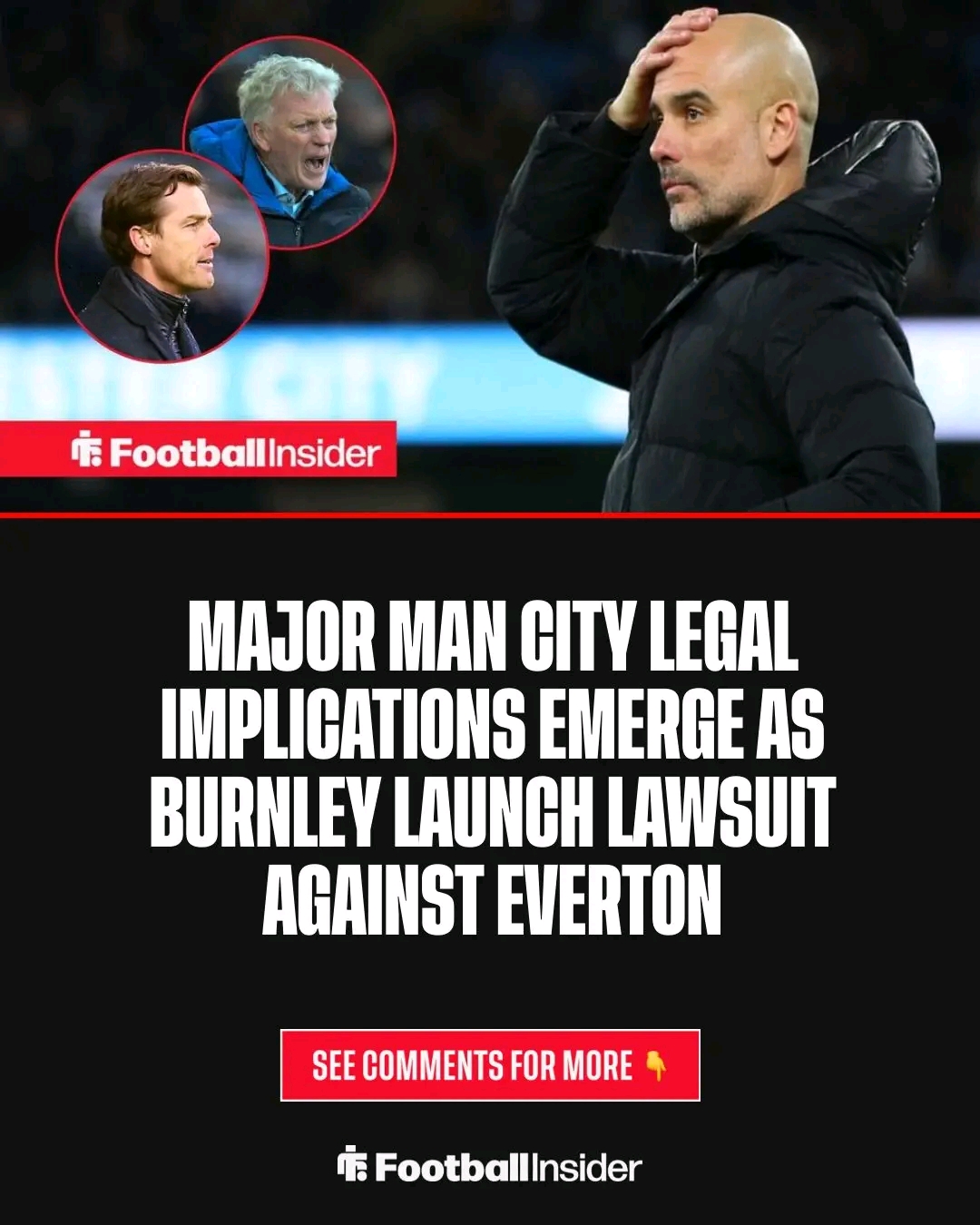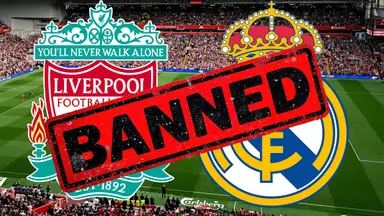Major Man City legal implications emerge as Burnley launch lawsuit against Everton

It started like a whisper in the wind but has now grown into a storm that could shake English football to its very foundations. Burnley, a club that has lived through the bitter taste of relegation and the financial struggles of fighting their way back, have launched a legal war against Everton. But while the lawsuit is directed at the Toffees, many eyes have now turned nervously towards Manchester City and their 115 looming charges. For Pep Guardiola and the champions of England, this might not just be Burnley versus Everton—it might be the opening of a door that exposes City to the biggest legal and financial earthquake in Premier League history
The story stretches back to the 2021-22 season, a season that felt like pure agony for Burnley. They fought until the very end but were relegated by the smallest of margins. Just three points separated them from Leeds United, and only four from Everton. Every Burnley supporter remembers those painful weeks when survival slipped away, when hopes were crushed, and when the Premier League door slammed shut in their faces. What made it more unbearable was the knowledge that Everton had already broken profit and sustainability rules in that same season. Yet, despite those breaches, Everton were not punished immediately. No points deduction came until November 2023, far too late to save Burnley. By then, the damage had already been done.
Now, Burnley want justice. They are demanding at least £50 million in compensation, arguing that Everton’s delayed punishment cost them their Premier League survival. That lawsuit is now moving forward, and legal experts have started to whisper the same words that will make Manchester City tremble—“precedent.” Because if Burnley win, if they prove that Everton’s financial breaches directly caused them to lose revenue and suffer relegation, then the floodgates could swing wide open. Suddenly, other clubs could turn to City, armed with the same logic, and claim damages for years of dominance that they believe were fuelled by financial unfairness.
Pep Guardiola, standing on the touchline in his white shirt during City’s latest game, may appear calm and focused. But behind closed doors, the tension is growing. The Catalan mastermind has already admitted in past press conferences that the 115 charges hanging over his club have been a heavy cloud, a constant distraction. City, who pride themselves on control and precision, are now living in a world of uncertainty, one where legal decisions off the pitch may be just as decisive as performances on it.
The situation grows even darker when you consider the details. Everton were initially handed a 10-point deduction, later reduced to six on appeal. That six-point penalty, had it been applied in 2021-22, would have condemned the Toffees to relegation instead of Burnley. For Burnley, the numbers tell the story. They believe those six points were the difference between survival and collapse, between the riches of the Premier League and the financial pain of the Championship. That belief has now transformed into legal firepower, and their lawsuit could reshape how financial breaches are punished forever.
For Manchester City, the threat is clear. If Burnley can prove financial breaches directly harmed them, then clubs who finished second, third, or fourth in years dominated by City might look at the trophies and prize money they lost and ask the same question: “What if?” Liverpool, who spent season after season chasing City in title races decided by the smallest of margins, could argue that financial irregularities denied them championships. Manchester United, Arsenal, Chelsea, Tottenham—all could potentially join the line if Burnley win. What starts as £50 million for one club could spiral into hundreds of millions, maybe even billions, if claims against City begin.
For years, City’s legal team has fought tooth and nail against the 115 charges, insisting on their innocence and accusing rivals of jealousy. But the danger here is not only about guilt or innocence—it is about perception, timing, and precedent. If the court decides Everton cost Burnley their place in the Premier League, then the spotlight on City’s case intensifies. Suddenly, it is not only the Premier League watching—it is every rival club, every lawyer, every financial analyst waiting for the chance to launch their own attack.
Inside the Etihad, the timing could not be worse. The summer of 2024 was already one of caution. For the first time in years, City’s spending looked hesitant. There was no all-out Galáctico signing. Instead, the club moved carefully, picking up talented players like Tijjani Reijnders, Rayan Cherki, and Gianluigi Donnarumma. On paper, it was a strong summer. But on the pitch, something felt off. The swagger was missing, the sharpness dulled. Liverpool, under Arne Slot, smelled weakness and attacked with full force, pushing City out of the way with fearless football.
The Manchester derby was a reminder that City are still a giant. In that match, they rose from the shadows, Foden and Haaland leading the charge, Guardiola orchestrating with his usual brilliance. Yet even in victory, the storm clouds returned as newspapers reminded the world of Burnley’s lawsuit and the possible ripple effect. The message was simple—no matter how strong City look on the pitch, the real battle may be fought in courtrooms and legal chambers, not stadiums.
For Burnley, this is more than money—it is about revenge, pride, and fairness. Their supporters still sing songs of injustice, still speak about how Everton “escaped” while they paid the ultimate price. Now, they believe this lawsuit is a chance to rewrite history, to show the football world that rules must have consequences. For City, it is a nightmare, because Burnley’s fight is not really about them, yet it might determine their fate.
The legal experts who spoke to *The i* were blunt. If Burnley succeed, the door is wide open. Other clubs could use the same argument against City if their charges are proven. And unlike Everton’s single breach, City’s list is overwhelming—115 separate allegations stretching from 2009 to 2018. Imagine the claims. Imagine the billions that could be demanded. It would not just be about points deductions. It would be about rewriting entire seasons of football history.
Pep Guardiola knows this. His job is to keep his players focused, to stop the noise from drowning out the football. He needs to keep Haaland scoring, Foden creating, Rodri controlling, Dias defending. He needs to make sure that every training session is sharp, every game ruthless, because distractions like this can break even the greatest of squads. Yet he also knows that if the legal battle turns ugly, his brilliance on the pitch may not be enough.
Manchester City’s rivals are watching closely. Liverpool fans speak of “tainted titles,” Arsenal fans remember the near misses, Manchester United supporters dream of stolen glory. All of them know that Burnley’s lawsuit might be the beginning of something much larger. And in football, when one domino falls, others soon follow.
The Premier League is already facing questions. Why did it take so long to punish Everton? Why are City’s charges still unresolved after years? Why do financial breaches not come with immediate consequences? Burnley’s lawsuit could force answers, and those answers may not be comfortable for the league, or for City.
As the 2025-26 season unfolds, the drama is no longer just about goals, saves, and victories. It is about legal documents, compensation claims, and the fear of history being rewritten. City have built an empire, but empires can fall not only to rivals on the battlefield but to lawyers in the courtroom.
For Burnley, the goal is £50 million. For Everton, it is survival. For City, it is everything—their reputation, their legacy, their future. Guardiola will fight to keep his team united, but the whispers grow louder every day: if Burnley win, City may face the biggest reckoning English football has ever seen.
And so, the stage is set. Burnley versus Everton may look small on the surface, just one relegated club against one survivor. But beneath it lies a legal bomb that could explode across the Premier League, and Manchester City, champions of England, may be standing right in the blast zone.














